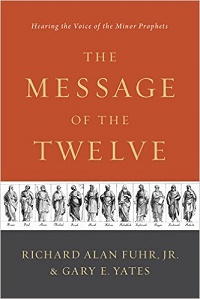 While we would not expect those who do not believe in the Bible to affirm its relevance for today, we should not expect Christians to think likewise. However, there are a number of Christians who do not see the relevance of all 66 books of the Bible. One group of books in the Bible to which Christians struggle finding value and relevance is the minor prophets.
While we would not expect those who do not believe in the Bible to affirm its relevance for today, we should not expect Christians to think likewise. However, there are a number of Christians who do not see the relevance of all 66 books of the Bible. One group of books in the Bible to which Christians struggle finding value and relevance is the minor prophets.
Admittedly, the minor prophets do not show up on the top three most loved books of the Bible by Christians nor are many “life verses” chosen from them. But, when readers of these twelve short, yet powerful, books are served by aids to understand them, their timeless relevance shines through.
Professors Richard Alan Fuhr Jr. and Gary E. Yates have given us such a reading aid in their new book The Message of the Twelve: Hearing the Voice of the Minor Prophets (B&H, 2016). This is an accessible guide to understanding the context of the minor prophets, the message of each, and the timeless relevance they have for the Church.
The first four chapters of the book explore some of the fundamental issues readers will need to grasp in order to understand the message of the minor prophets. The first chapter provides a short survey of the historical context in which each book takes place starting with Jeroboam I and the book of Jonah and ending with Malachi who prophesied during the time just before or during the time of Ezra and Nehemiah (18).
Chapter two examines the prophetic role of the prophets as foretellers and forth-tellers. While most readers of the prophets are quick to characterize the prophets primary role as foretellers (predictors of the future), the authors rightly point out that much of what is said is characterized rather as forth-telling (proclaiming the Word of God to his people). The third chapter provides a brief sketch of all of the literary genres and rhetorical devices the prophets used in order to communicate their divine message. This is one of those introductory chapters readers might turn to time and time again while reading through the prophets. The fourth chapter argues that the minor prophets are in fact a literary unit more than twelve individual books. This conclusion is borne out by several aspects including their chronology, unified view of the Day of the Lord, repeated call to repentance, covenant focus, and view to a new David.
The bulk of the book is dedicated each of the minor prophets. The chapters begin with an introduction to each book which discusses some of the key themes or aspects as well as the overall structure of the book. The bulk of the chapter is an accessible exposition of the entire book section by section. There are further discussions of the historical situations referred to in the book, discussions of important exegetical issues, and the literary and rhetorical aspects of the passages are explained. The final portion of each chapter challenges the reader with a theological reflection on the message of the book and the practical impact the passage has for today’s readers.
Fuhr and Yates have provided the church a rich, theological focused, text centered, guide to reading the minor prophets that does not sacrifice content in its brevity. The Message of the Twelve is a highly accessible book to guide readers through these old, yet timely books. This will serve as a great guide for personal study as well as those who are teaching or preaching through the minor prophets.
I received this book for free from B&H for this review. I was not required to write a positive review. The opinions I have expressed are my own. I am disclosing this in accordance with the Federal Trade Commission’s 16 CFR, Part 255 : “Guides Concerning the Use of Endorsements and Testimonials in Advertising.”
Leave a comment